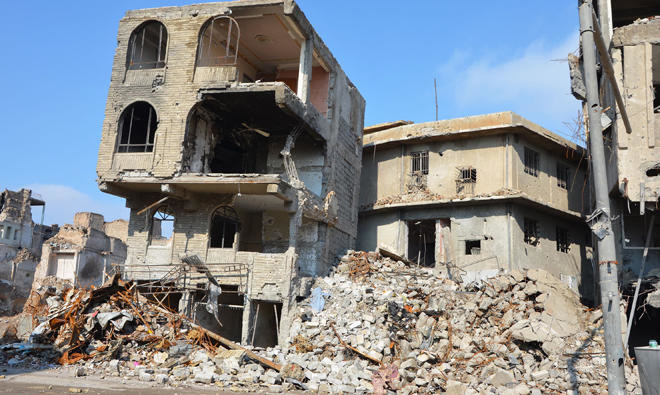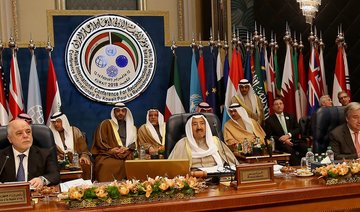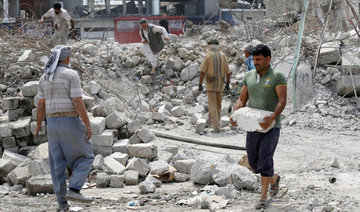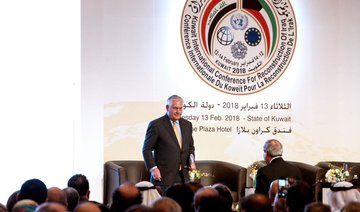BAGHDAD: The multi-billion loans and credits offered to Iraq at an international donors conference in Kuwait have raised dozens of questions about what the government will offer in return.
It has also reinforced concerns in Baghdad about the encumbrance of Iraqi monetary policy with the policies of the International Monetary Fund and the World Bank.
Iraq has estimated the cost of damage caused by Daesh and the three year war against the militants at $88 billion. Some $23 billion is urgently needed to clean the mine-contaminated areas, provide the daily basic services for the affected areas and bring 2.3 million displaced people back to their homes.
In coordination with the United Nations and the International Monetary Fund, Iraq this week held an international conference for reconstruction hosted by Kuwait. The conference, which was attended by more than 2,000 local and international companies from 70 countries, has made Iraq about $30 billion, mostly in sovereign loans.
But the lack of clarity about the loans has opened the door for critics of Iraqi prime minister Haider Abadi.
Abadi said yesterday that Iraq would start next month its negotiations with the countries who had offered the financial assistance.
He said international companies looking to invest in Iraq and local financial institutions would follow the required-facilities that the government has to provide to the companies to start these investment projects.
“No loans will be accepted but within the limits of the (annual Iraqi) budget,” Abadi said. “We are very cautious when it comes to the loans…we have not taken these loans, (as) we are looking for the loans that lead to development, create jobs and add value to the country.”
Prof. Salam Samisem, who specializes in finance and economics, told Arab News that the conference had failed “because it openly showed that the international society does not trust the Iraqi government due to the corruption and the inappropriate environment for investment in Iraq.”
“The government needs the US and other countries to provide credit loans for the international companies to convince them to come and work in Iraq.
“Loans mean interests, guarantees and time tables. How will the government achieve the conditions of the International Monetary Fund and the World Bank? What will the government offer as collateral? What are the benefits and conditions? These all are questions that Abadi must answer before agreeing to accept these loans,” Samisem said.
The dominance of political, sectarian and ethnic quotas on the legislative and executive authorities in Iraq, the absence of legal accountability and weak laws of integrity, means Iraq has been one of the most corrupt countries since 2003.
The investment environment in Iraq is considered hostile for international companies due to the unstable security and political situation and the lack of guarantees necessary to protect the rights of investors, which requires the intervention of the United States as guarantor instead of the Iraqi government, economists told Arab News.
“Investment in mega projects such as infrastructure projects need an integrated tax system and a regular legal collection process. This is not currently available in Iraq and will not be achieved soon,” a senior Iraqi economist told Arab News.
“Abadi has not done his homework before going to the conference. He has not modified the law of Investment in Iraq or limit the corruption rampant in all the governmental departments or provide any guarantees that the investors will be protected and no political or armed hands will reach them.”
Specialists contacted by Arab News said that if Iraq accepted these loans, this would mean that Iraqi monetary policy would be hostage to the policies of the World Bank and the International Monetary Fund.
“Financially, the conference failed and has not achieved its goals. These loans and associated conditions will be a burden on Iraq,” Bassim Antwan, an Iraqi economic analyst said.
“Everything will depend on the negotiator who will negotiate with the investment companies to decide the final conditions of each project separately.
“If the Iraqi negotiator will be strong enough and totally understands what he has to do, he may reduce the risks,” Antwan, said.
Critics of the results of the conference said the loans mean “swarming” Iraq with more debt, especially now that the government has exceeded the maximum limit-determined by the Iraqi Central Bank over the past four years.
Economists in Iraq raise questions over rebuilding loans
Economists in Iraq raise questions over rebuilding loans

Palestinian Authority at risk of collapse, Norway says

- Norway chairs the international donor group to the Palestinians and is a backer of the Palestinian Authority
OSLO: The Palestinian Authority could collapse in the coming months, Norwegian Foreign Minister Espen Barth Eide said on Monday, citing a lack of funding, continuing violence and the fact that half a million Palestinians are not allowed to work in Israel.
“The Palestinian Authority, with whom we work closely, are warning us that they might be collapsing this summer,” Barth Eide said.
Norway chairs the international donor group to the Palestinians and is a backer of the PA.
Jordan braces for scorching heatwave as temperatures soar

- The Gulf of Aqaba reached highs of 45 celsius
- Temperatures in Jordan are set to rise slightly, with the heatwave persisting
AMMAN: The Jordan Meteorological Department forecast extreme heat for Monday, with most regions of the country — particularly the desert areas, Jordan Valley, Dead Sea and Aqaba — experiencing intense temperatures.
The Gulf of Aqaba reached highs of 45 celsius, the Southern Jordan Valley 44 celsius, Dead Sea 43 celsius, while the Desert Regions and the Northern Jordan Valley reached highs of 41 celsius.
Cloud cover at medium and high altitudes is expected in the south and east of the Kingdom, state news agency Petra reported, with moderate northwesterly winds occasionally becoming brisk.
The JMD cautioned people against prolonged sun exposure, which could lead to dehydration, especially for vulnerable groups such as the elderly and those with health conditions. It also highlighted the risk of forest fires and the dangers of leaving children or flammable items, like perfumes and sanitizers, inside vehicles.
Looking ahead to Tuesday, temperatures in Jordan are set to rise slightly, with the heatwave persisting. Most areas will remain hot, the JMD said, and desert regions will face sweltering conditions. Northeasterly winds will prevail, shifting to moderate northwesterly by evening.
The heatwave will continue into Wednesday, with another slight increase in temperatures. Conditions will be blistering and dry across the highlands, the JMD warned, with extreme heat persisting elsewhere. Northeasterly winds will turn to moderate northwesterly later in the day.
Thursday will bring a modest reprieve as temperatures dip slightly. However, the weather will remain hot across most areas, with the desert, Jordan Valley, Dead Sea, and Aqaba continuing to sizzle. Moderate northwesterly winds will occasionally become brisk.
Iran calls for joint action by Islamic nations to stop Gaza war

- Israel’s military offensive on Gaza has killed at least 37,337 people so far
TEHRAN: Iran’s Acting Foreign Minister Ali Bagheri Kani has called for joint action on the part of Islamic countries to pressure Israel into ending its brutal military activities in Gaza, which have devastated most of the enclave and killed thousands of Palestinians there.
Israel’s military offensive on Gaza has killed at least 37,337 people, mostly civilian women and children, since the Oct. 7 Hamas attack, according to the Hamas-run Health Ministry in Gaza.
Humanitarian supplies for millions of Palestinians displaced by the conflict have been squeezed despite the Israeli military declaring it would “pause” fighting daily around a southern route to facilitate aid flows.
The Iranian official also spoke with his Afghan counterpart Amir Khan Muttaqi via telephone on Sunday, with the two discussing bilateral relations as well as the situation in war-ravaged Gaza.
Kani reiterated Iran’s readiness to help Kabul resolve its challenges and achieve growth, Iran’s news agency IRNA reported.
Kuwaiti citizen detained for alleged involvement in extremist group

KUWAIT CITY: The Public Prosecution in Kuwait has ordered the detention of a citizen on charges of joining a group aimed at illegally undermining the country’s basic systems, state news agency KUNA reported on Sunday.
The individual is also accused of receiving training in making explosives and preparing poisons for illicit purposes, as well as planning to leave the country to fight with the group, though he was unable to do so.
The Public Prosecution interrogated the accused and presented him with the charges, according to a statement released on its official account on X. Investigation procedures are ongoing.
Yemen’s Houthis announce new maritime operations in support of Gaza

- The Houthis declared that attacks on Israel-linked shipping will persist until Israel ends its war on Gaza and lifts the siege on Palestinian territories
SANAA: The Houthi militia’s army spokesman, Yahya Saree, announced on Sunday that an American destroyer and two Israel-linked ships were targeted in recent operations in the Red and Arabian seas.
Saree said that the US destroyer was hit by ballistic missiles in the Red Sea, while the two ships — Captain Paris and Happy Condor — were targeted in the Arabian Sea using naval missiles and drones, respectively.
He stated that these ships were targeted because they were en route to ports in Israeli-occupied territories.
Saree reaffirmed Yemen’s stance, declaring that attacks on Israel-linked shipping will persist until Israel ends its war on Gaza and lifts the siege on Palestinian territories.
He also emphasized that the Yemeni army would continue to defend its territory against US-UK “aggression,” referring to joint airstrikes by the two Western nations, which the latter claim were launched to protect international shipping.
The Houthis have rejected these claims, asserting that their military operations in international waters, ongoing since mid-November, only target Israeli ships or vessels heading to Israeli-occupied ports.
















